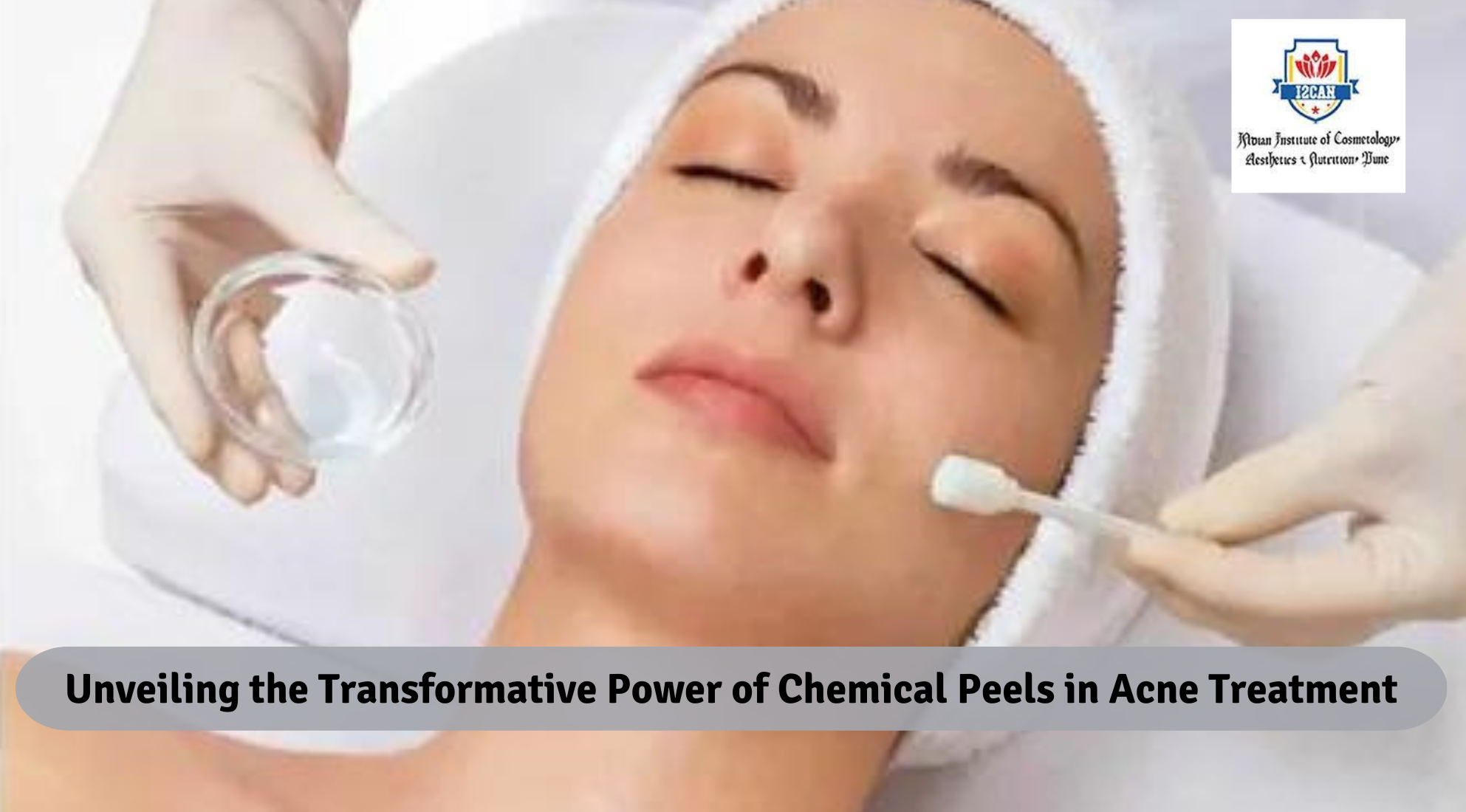Introduction:
Acne, a common skin condition affecting millions globally, can have a significant impact on one’s physical appearance and emotional well-being. Countless individuals seek effective solutions to alleviate the burden of acne, and among the array of treatment options, chemical peels have emerged as a promising avenue. In this comprehensive exploration, we delve into the science behind chemical peels, their efficacy in treating acne, and the role played by the Indian Institute of Cosmetology Aesthetics and Nutrition (IICAN) in advancing the field.
Understanding Chemical Peels:
Chemical peels involve the application of a chemical solution to the skin, causing controlled exfoliation and peeling. These peels vary in strength, with superficial, medium, and deep peels addressing different skin concerns. The primary objective of chemical peels is to remove damaged outer layers of skin, revealing a smoother, rejuvenated complexion beneath.
How Chemical Peels Combat Acne:
Chemical peels combat acne through various mechanisms, making them a versatile and effective treatment option.
- Exfoliation and Unclogging Pores:
- Superficial peels, such as those containing alpha hydroxy acids (AHAs) or beta hydroxy acids (BHAs), exfoliate the outer layer of the skin, unclogging pores and preventing the formation of comedones (blackheads and whiteheads).
- Reducing Sebum Production:
- Certain chemical peels can regulate sebum production, a key factor in acne development. By controlling oiliness, peels contribute to a less favorable environment for acne-causing bacteria.
- Anti-Inflammatory Effects:
- Chemical peels possess anti-inflammatory properties, reducing redness and swelling associated with acne lesions. This anti-inflammatory action helps in preventing the progression of mild to moderate acne.
- Stimulating Collagen Production:
- Medium to deep peels, containing ingredients like trichloroacetic acid (TCA) or phenol, stimulate collagen production. This not only aids in scar reduction but also enhances overall skin texture and resilience.
IICAN’s Contribution to Advancing Chemical Peel Research:
The Indian Institute of Cosmetology Aesthetics and Nutrition (IICAN) has been at the forefront of advancing research and education in the field of cosmetology, including chemical peels. With a commitment to excellence, IICAN has played a pivotal role in enhancing our understanding of the science behind chemical peels and their applications.
- State-of-the-Art Research Facilities:
- IICAN boasts state-of-the-art research facilities equipped with the latest technology. Researchers at IICAN have access to cutting-edge tools for investigating the molecular mechanisms underlying the effectiveness of chemical peels in treating acne.
- Collaboration with Industry Experts:
- IICAN fosters collaborations with leading dermatologists, skincare professionals, and industry experts. This collaborative approach ensures a holistic understanding of chemical peel applications, facilitating the development of innovative and effective treatments.
- Comprehensive Training Programs:
- IICAN offers comprehensive training programs for aspiring cosmetologists and skincare professionals. These programs include in-depth modules on the science of chemical peels, their application in various skin conditions, and hands-on training to hone practical skills.
Efficacy of Different Chemical Peel Types:
- Glycolic Acid Peels:
- Derived from sugarcane, glycolic acid peels are effective in treating mild acne. They exfoliate the skin, unclog pores, and improve overall skin texture. IICAN’s research highlights the safety and efficacy of glycolic acid peels in acne-prone individuals.
- Salicylic Acid Peels:
- Salicylic acid, a beta hydroxy acid, is renowned for its ability to penetrate oil-filled pores. Salicylic acid peels are effective in treating both non-inflammatory and inflammatory acne lesions. IICAN emphasizes the importance of proper concentration and application techniques for optimal results.
- TCA Peels:
- Trichloroacetic acid peels penetrate deeper layers of the skin, making them effective for moderate acne and acne scarring. IICAN’s research underscores the significance of customization based on individual skin types and conditions to prevent adverse effects.
- Combination Peels:
- IICAN advocates for the use of combination peels, blending various acids to address multiple aspects of acne. Combining salicylic acid with glycolic acid, for instance, can provide a synergistic effect, targeting both pore-clogging and inflammation.
Post-Treatment Care and Considerations:
While chemical peels offer significant benefits in acne treatment, proper post-treatment care is crucial to ensure optimal results and minimize potential side effects.
- Sun Protection:
- IICAN emphasizes the importance of sun protection post-peel, as the skin becomes more susceptible to damage. Sunscreen with a high SPF is recommended to prevent hyperpigmentation and other UV-induced complications.
- Hydration and Moisturization:
- Adequate hydration is essential post-peel to support the skin’s healing process. IICAN recommends non-comedogenic moisturizers to maintain skin hydration without exacerbating acne.
- Avoiding Irritants:
- IICAN advises against the use of harsh skincare products post-peel, as the skin may be more sensitive. Products containing alcohol or strong fragrances should be avoided to prevent irritation.
- Follow-up Sessions:
- Depending on the severity of acne and individual response, multiple peel sessions may be required. IICAN provides guidelines for the frequency of sessions and monitors patient progress to ensure the safety and efficacy of the treatment.
Conclusion:
In the realm of acne treatment, chemical peels stand out as a versatile and effective option. Their ability to address various aspects of acne, coupled with advancements in research and education, has propelled their popularity. The Indian Institute of Cosmetology Aesthetics and Nutrition (IICAN) has significantly contributed to the evolution of chemical peel applications through cutting-edge research and comprehensive training programs. As we continue to unravel the mysteries of skincare, chemical peels, with the guidance of institutions like IICAN, offer a promising path towards clearer, healthier skin.

